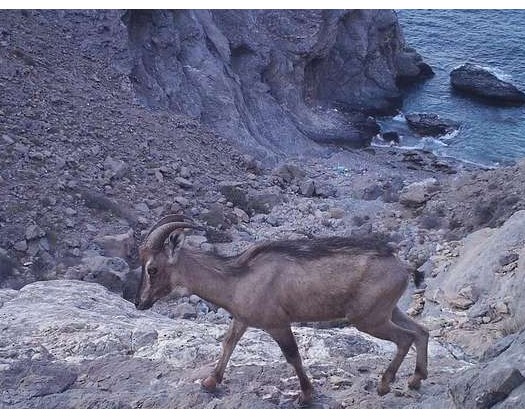A recent field study conducted by the Environmental Conservation Office at the Environment Authority in Muscat, Oman, has uncovered a remarkable discovery. The study focused on tracking the movements of the Arabian Ibex, also known as the Tahr, in the Ras Abu Dawood area. During the study, the research team observed an Arabian Ibex drinking seawater, a behavior rarely seen among land animals.
To monitor the Ibex, camera traps were set up in the area, capturing their activities on three separate occasions. HH Sayyid Taimur bin Abdullah Al Said, an environmental systems specialist at the Environment Authority, highlighted the significance of this finding. He explained that the consumption of seawater is highly unusual for land-dwelling creatures.
The study site, located in Ras Abu Dawood, is characterized by its isolation and limited availability of fresh water. With an average annual rainfall of 117.2 mm, mostly occurring during the winter, and a hot climate in the summer, the Ibex's ability to drink seawater becomes even more remarkable.
The Arabian Ibex, scientifically known as Arabitragus jayakari, holds great importance in the Sultanate of Oman. This small mountain goat, belonging to the Bovidae family, is endemic to the Al Hajar mountain range in the Arabian Peninsula. Its habitat stretches from the Musandam Governorate to Ras Al Hadd in the South Al Sharqiyah Governorate, making it the sole home of the Arabian Ibex in the world.
Sayyid Taimur Al Said emphasized that these animals thrive in steep and rugged terrains, often inhabiting altitudes ranging from 400 to 1,200 meters. This field study sheds light on the adaptability and resilience of the Arabian Ibex, further highlighting the importance of conserving their unique habitat.
The Environmental Conservation Office's previous research revealed that the region is home not only to the Arabian Ibex but also to other species such as the Arabian Gazelle, Arabian Wolf, Lynx, Wild Cat, Red Fox, and Mountain Fox.
According to the Environment Authority's expert, the study demonstrated the Arabian Ibex's ability to drink seawater in the Ras Abu Dawood area, where fresh water is scarce. This behavior serves as a nutritional supplement due to the lack of sodium and minerals.
The Ibex was observed using two cameras, one monitoring the male Ibex and the other the female and baby Ibex.
The Arabian Ibex drinks seawater for a brief 2-3 seconds from large pools on the rocky shore during low tides, not directly from the sea.
Preserving the behavioral diversity of the Arabian Ibex is crucial, as it aids in adaptation and survival in arid environments, similar to genetic diversity in endangered species.
These behaviors may assist the Arabian Ibex in facing future environmental changes in the region.
It is important to note that this environmental study was published in the peer-reviewed journal Arid Environments on the science direct website, which features international scientific papers and research across various fields, including environmental studies.









